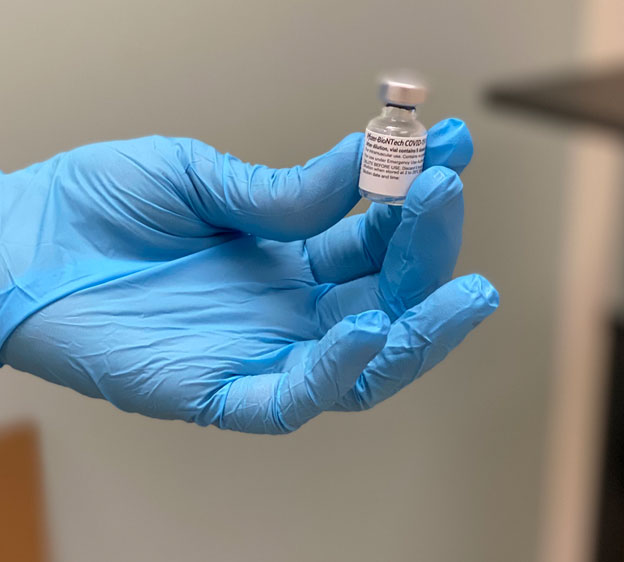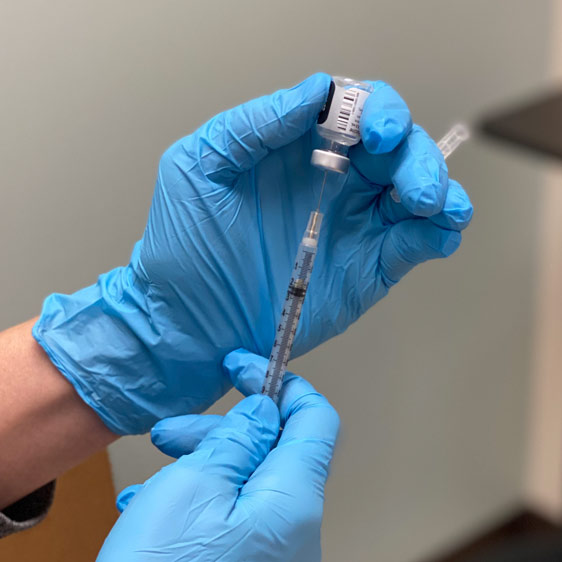COVID-19 Vaccine FAQs
February 23, 2021
As the new COVID-19 vaccinations become more readily available, we’re finding many people have concerns about vaccine safety and efficacy. Below, Dr. Kurt Gambla, chief medical officer at Beaufort Memorial, answers some of the most common questions we have received about the vaccines.
Q: Are COVID vaccines safe and are there side effects from the shots?
A: The Pfizer-BioNTech and Moderna vaccines currently available in the U.S. are extraordinarily safe. Many people experience no side effects from the shots. For those who do, the side effects are similar to what you might experience with flu shots — sore arm, mild fever, fatigue and achiness. Most often, the side effects occur after the second dose and rarely last more than a day or two.
Read More: The COVID-19 Vaccine, Explained
Q: If I have a history of allergies or allergic reactions to medicines and/or vaccinations, can I still get the COVID vaccine?
A: You should discuss the risks versus benefits of getting the vaccine with your primary care provider, who is most familiar with your medical history and able to give you the best advice. Generally speaking, a history of allergic reactions to medications is not a deal breaker but may require you to be observed a little longer — about 30 minutes rather than the usual 15 minutes — after you’ve been inoculated. Severe allergic reactions to these vaccines are extremely rare and almost always occur in the first 30 minutes. Vaccine centers should have medications available to rapidly and effectively treat anyone experiencing an adverse reaction.
Q: Is it true that I shouldn’t be vaccinated if I’m pregnant, breastfeeding or immunocompromised?
 A: While there is less data on those factors, many pregnant or breastfeeding women, as well as immunocompromised patients, have been successfully vaccinated with no ill effects. You should talk with your primary care provider about your individual situation and health risks.
A: While there is less data on those factors, many pregnant or breastfeeding women, as well as immunocompromised patients, have been successfully vaccinated with no ill effects. You should talk with your primary care provider about your individual situation and health risks.
Q: Can children receive the COVID-19 vaccine?
A: At this time, you must be a least 12 years of age to receive the Pfizer-BioNTech vaccine and 18 for the Moderna shot. Studies are currently being conducted to determine if the age limits should be lowered.
Q: Are the vaccines effective?
A: Yes. In more than 90% of cases, vaccine recipients will not become ill from a COVID-19 infection. In the rare cases where a vaccine recipient becomes infected, it is believed the symptoms and duration of illness should be significantly reduced.
Read More: Addressing Vaccine Concerns: Myth vs. Fact
Q: Of the Pfizer-BioNTech and Moderna vaccines, which is best?
A: Because both vaccines are very similar and have been shown to be safe and effective, the “best” vaccine is the one you can get in your arm the soonest.
Q: How long are the vaccines effective and will I need a booster? Will all the new variants we’re hearing about make the current vaccines useless?
A: Since the vaccines have not been available for very long, we don’t know for certain how long immunity lasts. However, this is being closely studied. The prevailing opinion is that there will be a need for periodic boosters, but the interval has yet to be determined. So far, it looks like the current vaccines will be effective against the variants we are seeing. Moreover, the vaccines can be tweaked if needed to cover any new variants, just as flu vaccines change every year based on which influenza viruses are most likely to make people sick.
Q: Once I am vaccinated, can I stop wearing a mask and resume attending activities where there are crowds?
A: After you are fully vaccinated against COVID-19 (two weeks after completing your vaccine regimen), you may be able to start doing some things that you had stopped doing because of the pandemic.
Learn more about vaccine availability and the vaccination process on our COVID-19 Info & Resources page.
